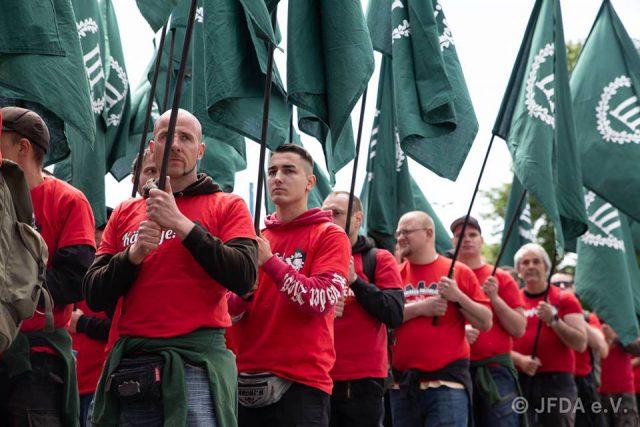
A recent German music industry awards night, expected to be a festive occasion, instead brought to the surface an ugly undercurrent of anti-Semitism. The annual Echo Music Prize recognises musical achievements by German and international artists, producers and record labels.
This year, controversial German rappers Kollegah and Farid Bang received an Echo for best hip-hop/urban album. In Jung Brutal Gutaussehend 3 (Young, brutal, good-looking 3), one line in particular caused an outcry: ‘My body is more defined than those of Auschwitz inmates’.
The award was highly criticised at a time when Germany is facing the return of what was thought a relic of the past. Anti-Semitic attacks have been increasing across the county. Last year, a 14-year-old Jewish student left his school after being verbally and physically attacked by fellow students. In 2012, Berlin’s rabbi Daniel Alter was brutally attacked in front of his young daughter. Media reports say schools in Berlin have seen a sharp rise in the number of attacks on Jewish students and struggle to find appropriate responses.
But it took the openly displayed hatred on a video for the federal government and other political and cultural representatives to publicly express their shock and condemnation. The video showed a young man being slapped with a belt while his attacker repeatedly yells ‘Jew’ in Arabic into his face.
It turned out that the victim wasn’t Jewish, but he’d wanted to see if claims by his friends that one could no longer wear a kippah safely on the streets of Berlin were true. In an interview with DW, he explained that he had grown up in an Arab family in Israel.
Most Germans felt that their country has been openly and effectively dealing with the horrors of the Nazi era in large part through an extensive history education program in schools that covers the cruelties of the Holocaust. But a 2017 survey found that only 59% of students who took part knew what Auschwitz was. Among 14 to 16-year-olds, the figure was 47%.
On 18 April, RIAS (the Research and Information Office Anti-Semitism Berlin) published a report about incidents in 2017. In Berlin alone there were 947 anti-Semitic incidents, including physical attacks, threats and damage to property. The number of reported incidents of harmful behaviour, which includes online and verbal attacks, almost doubled from 366 in 2016 to 679 last year—and these were only the reported incidents.
While attacks are perpetrated by a variety of groups, it’s estimated that 80% come from members of the far-right and neo-Nazi scene. The number of such abuses carried out by Muslims appears to be increasing, and that plays into the hands of right-wing movements such as the Alternative for Germany, whose program focuses on anti-migrant and anti-Islam policies. At the same time, the party has representatives in state parliaments who can be lawfully referred to as ‘Holocaust deniers’ following a court ruling. The party also faces another scandal after a picture surfaced showing party officials giving the Hitler salute.
Every German citizen, and all those living in Germany, are obliged to remember and respect the country’s special duty of historical memory and under no circumstance to accept anti‑Semitic behaviour. In the same way, Germany and its people reject any anti‑Muslim or other racist behaviour.
The federal Interior Ministry has called for more action and has suggested that foreigners might lose their right to stay in Germany if they disregard the country’s values and democratic foundation. That, however, wouldn’t solve the rise in anti‑Semitic incidents perpetrated by German citizens.
Germany isn’t the only place struggling with a return of anti‑Semitism. It’s a concern in Australia as well. In November, the Executive Council of Australian Jewry’s annual report on anti‑Semitism revealed that in the 12 months from September 2016 to September 2017, the number of anti-Semitic incidents increased by 9.5%. While the number of actual attacks decreased, the volume of threats grew by 39%. Of 230 incidents, 145 were attacks that included assault, abuse, vandalism and graffiti.
Australian far-right groups target a broad range of groups, mainly focusing on Muslims and refugees. That mirrors a global trend among far-right and white-supremacist group. Increasingly they target Jewish organisations and individuals, particularly online. Anti-Semitic activities have occurred in Australia before, but not with the intensity that Jewish communities have observed over the last two years.
The resurgence has triggered an overdue debate in Germany. The Echo Music Prize debacle and subsequent outcry led to the prize being abolished. Record labels paused their collaboration with the two musicians, but only after initially arguing that they respected artistic freedom and freedom of speech.
This might seem a small step but it’s a step in the right direction—though it came very late and followed previous criticism of sexism and the glorification of violence in the rappers’ work. Meanwhile, the two rappers have accepted an invitation to visit the Auschwitz memorial to gain more knowledge on what happened there. Furthermore, thousands of people of all faiths recently showed their solidarity with Germany’s Jewish community at rallies nationwide.
The openly racist attacks in the streets and in school grounds will require more effort in education, school policies and integration measures. Much more needs to be done to make clear the penalties facing those who participate in anti-Semitic (and generally racist) behaviour, whether it’s verbal or physical, and regardless of the perpetrator’s citizenship or faith.